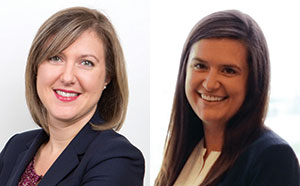KEEPING IT CONFIDENTIAL: Protecting privilege while you’re working remotely
By: WISCONSIN LAW JOURNAL STAFF//April 27, 2020//
KEEPING IT CONFIDENTIAL: Protecting privilege while you’re working remotely
By: WISCONSIN LAW JOURNAL STAFF//April 27, 2020//

(414) 225-1480 or [email protected].
By Elizabeth K. Miles and Anne V. O’Meara
The attorney-client privilege protects confidential communications between clients and their attorneys that are made for the purpose of rendering legal advice and are kept confidential.
As a result of COVID- 19, many attorneys and their clients are working from home. That means fewer in-person communications and working near family members. Consider these best practices for protecting the attorney-client privilege when working remotely.
Maintain confidentiality. Wisconsin Supreme Court Rule 20:1.6(a) prohibits attorneys from revealing information relating to the representation of a client unless the client gives informed consent, except for disclosures that are impliedly authorized in order to carry out the representation. This means attorneys should work away from family members so communications with clients or about clients cannot be overheard. Work in a room without a digital assistant like Amazon Echo or Google Home, which may be overhearing your conversations. Consider using separate computers for legal work or using password-protected folders, and store away physical, client-related files when they are not in use.
Supervise attorneys and nonattorneys. Wisconsin Supreme Court Rule 20:5.1(b) and 5.3(b) require an attorney who directly supervises another attorney or non-attorney to make reasonable efforts to ensure they comply with the Rules of Professional Conduct. A supervising attorney may be held responsible for an attorney’s or a non-attorney’s misconduct. If you are in a supervisory role, conduct regular check-ins with your team and remind others that confidentiality and privilege are still essential while working remotely.
Keep business and legal advice separate. In-house counsel often serve dual roles, providing legal advice and business advice to their companies. Legal advice is privileged; business advice is not. To ensure legal advice is protected, separate it from business advice and identify it as “Privileged and Confidential: Attorney-Client Communication.”
Encourage clients to call. It is easier for an opposing party in litigation to discover the content of a written communication than a phone call. Although in-person meetings have been curtailed, encourage clients to call for legal advice instead of email or text. Clients should conduct calls and video conferences with their attorney away from family members and digital assistants.
Remind clients to limit others’ involvement. Clients may be tempted to include people than necessary on communications with their attorney, especially on email. Remind clients that only people directly involved in the legal advice discussion should be included on emails, calls, and video conferences.
Legal News
- Waukesha man sentenced to 30 years for Sex Trafficking
- 12-year-old shot in Milwaukee Wednesday with ‘serious injuries’
- Milwaukee man convicted of laundering proceeds of business email compromise fraud schemes
- Giuliani, Meadows among 18 indicted in Arizona fake electors case
- Some State Bar diversity participants walk away from program
- Wisconsin court issues arrest warrant ‘in error’ for Minocqua Brewing owner
- Iranian nationals charged cyber campaign targeting U.S. Companies
- Facing mostly white juries, are Milwaukee County defendants of color truly judged by their peers?
- Milwaukee Mayor speaks in D.C. Tuesday at White House water summit
- Chicago man sentenced to prison after being caught with ‘Trump Gun’
- FTC bans non-competes
- Gov. Evers seeks applicants for Dane County Circuit Court
WLJ People
- Power 30 Personal Injury Attorneys – Russell Nicolet
- Power 30 Personal Injury Attorneys – Benjamin Nicolet
- Power 30 Personal Injury Attorneys – Dustin T. Woehl
- Power 30 Personal Injury Attorneys – Katherine Metzger
- Power 30 Personal Injury Attorneys – Joseph Ryan
- Power 30 Personal Injury Attorneys – James M. Ryan
- Power 30 Personal Injury Attorneys – Dana Wachs
- Power 30 Personal Injury Attorneys – Mark L. Thomsen
- Power 30 Personal Injury Attorneys – Matthew Lein
- Power 30 Personal Injury Attorneys – Jeffrey A. Pitman
- Power 30 Personal Injury Attorneys – William Pemberton
- Power 30 Personal Injury Attorneys – Howard S. Sicula











